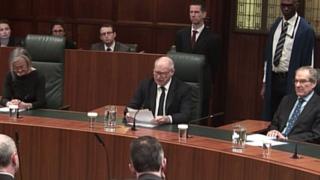
Supreme Court judges delivered their majority verdict
Judges at the Supreme Court have rejected the Scottish government’s argument that Holyrood should get a say on the triggering of Article 50.
The court decided that MPs must have a say on starting the formal process of Brexit via an act of parliament.
However, they also rejected arguments from the Lord Advocate that devolved administrations should also have a say.
First Minister Nicola Sturgeon has pledged to hold a Holyrood vote on the matter regardless of the ruling.
Ministers wanted to invoke Article 50 of the Lisbon Treaty, the formal process for leaving the European Union, without consulting the Westminster parliament.
Campaigners disputed this, saying the referendum result alone does not give ministers the power to change the British constitution and supersede legislation.
The Supreme Court justices backed the challenge by eight votes to three, with President Lord Neuberger summarising their ruling as: “The Government cannot trigger Article 50 without an Act of Parliament authorising it to do so.”
With Jeremy Corbyn pledging the support of Labour MPs to backing the government on Article 50, the defeat in court is not expected to derail the Brexit process, although it could pose complications.
The SNP and Lib Dems have vowed to vote against invoking Article 50 if it does go to a vote at Westminster.
‘Fatally undermined’
Meanwhile, the Scottish government was also represented in the Supreme Court case, with Lord Advocate James Wolffe arguing Holyrood’s consent should also be sought due to the “significant changes” Brexit would have on devolved powers.
Lawyers representing the UK government rejected this, saying the argument was “fatally undermined” by the fact that powers over foreign affairs are reserved to Westminster.
The judges unanimously rejected Mr Wolffe’s arguments, saying that the principle of legislative consent “does not give rise to a legally enforceable obligation”.
Later in the day, Ms Sturgeon will convene a meeting of her Standing Council on Europe, a team of legal, economic and diplomatic advisors.
Also in attendance will be External Affairs Secretary Fiona Hyslop, Brexit minister Mike Russell and Europe minister Alasdair Allan.
The first minister, who has said a second Scottish independence referendum is “undoubtedly” closer due to Theresa May’s Brexit plans, declared her intention to hold a Holyrood vote on Article 50 regardless of the ruling of the court.
Writing in the Daily Record newspaper, she said: “No matter what the court decides, I want to make this crystal clear – I intend to make sure the Scottish Parliament has the chance to vote on the question of triggering Article 50.
“If the UK government don’t start showing Scotland some respect, I’ll make sure that people across Scotland have the chance to choose our own future before the Tories drag us off an economic cliff-edge.”
Court rejects Scottish government Article 50 argument}

